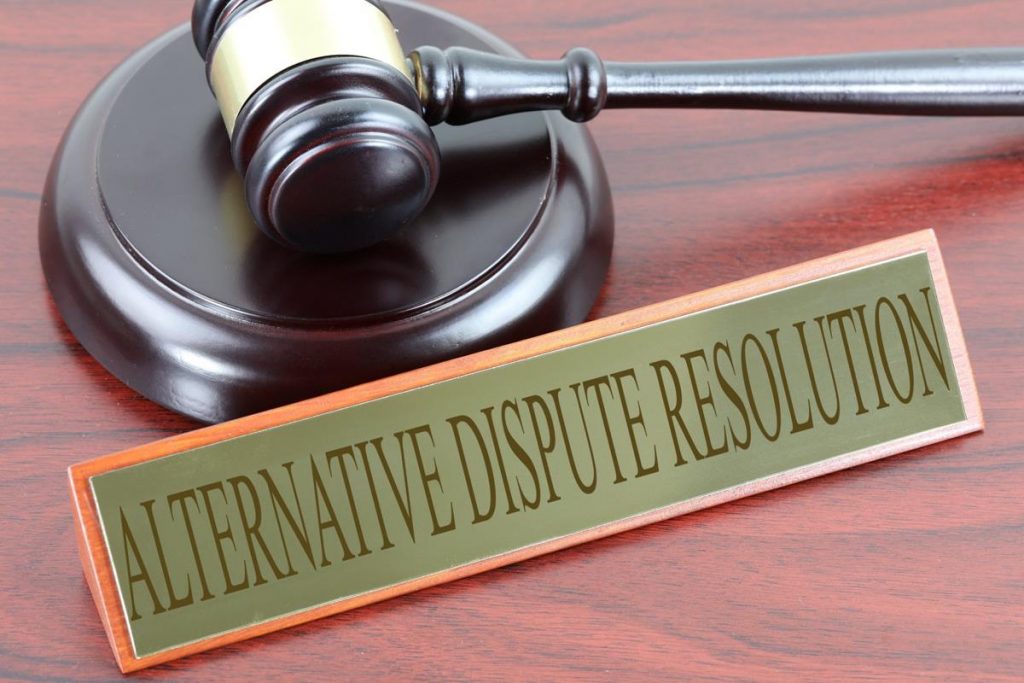What is Alternative Dispute Resolution?

In some dispute cases, the relationship between two parties may have broken down to such a point where litigation and going to court are the only way to reach a resolution.
Court cases are extremely expensive and time consuming however, and if an agreement is possible through other means, it is usually worthwhile considering.
Alternative Dispute Resolution (ADR) refers to the methods that can be used to resolve dispute cases without resorting to court proceedings and can be beneficial both in preserving a business relationship between two parties and in reducing the costs associated with the case.
What ADR options are available?
The most common types of ADR used in the UK are:
Mediation
Mediation refers to the process where an independent third party (known as the mediator) is appointed to attempt to work with both parties to achieve a negotiated outcome.
Mediation can be undertaken at any point during the dispute process and is often conducted alongside formal proceedings in an attempt to avoid escalation.
The contractual agreement between the two parties governing their business relationship may well require mediation to take place in the event that a dispute occurs, or the process may be entered into voluntarily if the parties are looking to find a fair resolution and continue their relationship.
Mediation is designed to be fully flexible and confidential and none of the discussions or written communications used in the process can be used in a court case.
Expert Determination
Expert determination is a binding process that involves having an expert or expert panel settle disputes around commercial or technical issues about which they have extensive experience and expertise.
There are a number of different trade bodies that provide expert determination services for those in their industry and can be a great way to get a definitive outcome without resorting to litigation.
Expert determination can only take place if both parties agree or there is an existing clause within an existing contractual agreement.
The expert or expert panel whose responsibility it is to make the determination must be agreed upon by both parties and their decision is final.
Once the decision has been made by the expert responsible for the case, the determination is binding and must be accepted and abided to by each party.
Arbitration
Arbitration is the most formal ADR option that can be used as an alternative to litigation.
Arbitration involves a tribunal process conducted by an independent arbitrator who will hear both sides of a dispute before making a legally binding decision.
The arbitrator selected for this process should be a pre-agreed disinterested party chosen by both parties.
There can be no complaints of bias through arbitration as any arbitrator that a party does not wish to use will be disregarded from the list of potential candidates.
Neither party is allowed to communicate with the arbitrator in private during the case.
Many companies also prefer this route as findings can be made confidential, keeping disputes in house and avoiding unwanted attention.
Arbitration is cheaper and faster than going through the court system but still allows for a legally binding resolution to a dispute.
In Scotland, the arbitration process is underpinned by the Arbitration (Scotland) Act 2010, which presents an adaptable framework that allows the best practice from across the world to be adopted over time to help create the most effective possible dispute resolution system.
Adjudication
Adjudication refers to the quick short term resolution of a dispute by an appointed third party.
It is a much faster process than arbitration and allows for a binding agreement to be put in place that will stand unless overturned by an arbitrator or in court.
Adjudication is an ADR process that exists in the construction industry to settle contract disputes.
Some of the most common disputes that are frequently resolved in this industry using an adjudicator include:
- Delayed payments
- Debates over craftsmanship
- Delays
- Contract disagreements
If a party wishes to overturn the final decision made by an arbitrator and there is no arbitration agreement on the table, the only option is to obtain a court order.
If you and your business are looking for a quick and relatively simple way to resolve a conflict, then the adjudication process could be the perfect solution.
Contact Us
At Oracle Law, we provide legal advice for all forms of ADR, including expert representation in arbitration cases, as well as being able to represent you in legal cases should the parties involved fail to agree to an out of court judgement.
For more information and expert legal advice today call us now on 0141 332 0915 or fill out our contact form.



